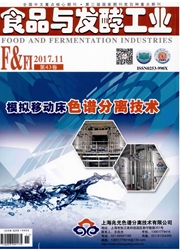

 中文摘要:
中文摘要:
以“大久保”水蜜桃果实(Prunus persica ( L. ) Batsch cv.‘OkuBa’)为试材,研究了0.2g/LBTH处理诱导的桃果实抗病性反应对其贮藏品质影响。实验结果表明:O.2g/LBTH处理可有效诱导桃果实在20℃贮藏期间的SAR反应,促进抗病相关酶几丁质酶和β-1,3-葡聚糖酶活性以及总酚含量的上升,从而有效控制了果实贮藏期间P.expansum导致的青霉病的发展;但BTH处理诱导的SAR反应同时显著降低了桃果实在贮藏期间的乙烯峰值以及葡萄糖和蔗糖含量,并可抑制总黄酮、总花色苷和类胡萝卜素的积累,从而导致果实出现后熟及次生代谢产物合成速度减慢等不良症状。由此推测,BTH诱导的SAR抗病性反应对采后桃果实来说是一个不可逆的物质和能量消耗过程,可能会影响果实后熟品质的形成。
 英文摘要:
英文摘要:
The present study was to investigate the effect of the disease resistance induced by 0.2 g/L benzo-th- iadiazole-7-carbothioic acid S-methyl ester (BTH) treatment on the storage quality in postharvest peaches (Prunus persica ( L. ) Batsch cv. ' OkuBa' ) at 20℃. The results of the experiment exhibited that the 0.2 g/L BTH treatment could effectively induced the reaction of systemic acquired resistance (SAR) , increased the activities of defense-relat- ed enzymes including chitinase and β-1,3-glucanase, and increased total phenolics content. Therefore, the develop- ment of the blue mold disease by P. expansum was significantly controlled. Nevertheless, the SAR induced by BTH treatment also lower the ethylene peak value and the contents of glucose and sucrose, inhibited the accumulation of to- tal flavonoids, anthocyanins and carotenoids during the storage, slowed down the negative symptoms of fruit ripening and secondary metabolites synthesis. Therefore, we speculate that the disease resistance reaction SAR induced by BTH is an irreversible energy and material consumption course for postharvest peach fruit and may influence the ripe- ning quality of the fruit.
 同期刊论文项目
同期刊论文项目
 同项目期刊论文
同项目期刊论文
 Response of direct or priming defense against Botrytis cinerea to methyl jasmonate treatment at diff
Response of direct or priming defense against Botrytis cinerea to methyl jasmonate treatment at diff Effect of ethanol treatment on disease resistance against anthracnose rot in postharvest loquat frui
Effect of ethanol treatment on disease resistance against anthracnose rot in postharvest loquat frui 期刊信息
期刊信息
